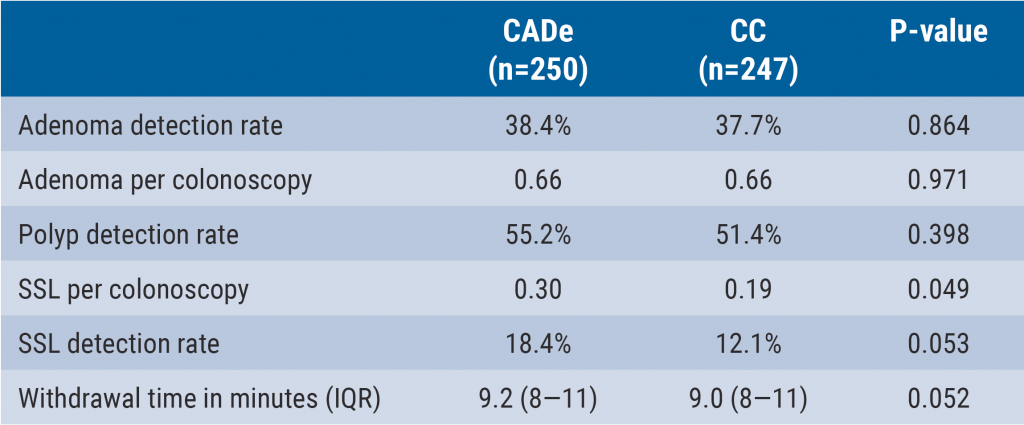https://doi.org/10.55788/8ae09aa5
Prof. Subrata Ghosh (Cork University College, Ireland) conducted a post-hoc pooled analysis of the ADVANCE (NCT03105128) and MOTIVATE (NCT03104413) induction trials and FORTIFY (NCT03105102) maintenance study to assess the effect of risankizumab on EIMs in participants with moderate-to-severe CD as compared with placebo [1]. At baseline, 622 participants with EIMs were included. “Importantly, most participants had failed on at least 1 biologic therapy,” emphasised Prof. Ghosh. The most common EIMs were peripheral arthropathy, anaemia, and axial arthropathy.
After 12 weeks of induction therapy, the percentage of participants with resolution of EIMs was 34.5% in the risankizumab group and 22.5% in the placebo group (P<0.05). Looking at specific EIMs, axial arthropathy was resolved in 50% and 30.8% of the participants in the risankizumab group and placebo group, respectively (P<0.05). Similar trends were observed for anaemia (37.4% vs 22.4%; P<0.05) and peripheral arthropathy (39.8% vs 31.2%; P>0.05), although the latter did not reach statistical significance.
In the maintenance period, at week 52, the percentage of participants with resolution of any EIM was 52.2% in the risankizumab 360 mg group, 41.7% in the risankizumab 180 mg group, and 36.3% in the placebo group. Finally, in participants who resolved EIMs following induction therapy, the corresponding rates at week 52 were 71.9%, 45.9%, and 45.0%, respectively.
The current post-hoc analysis showed that risankizumab is more efficacious than placebo in resolving EIMs and sustaining the resolution of EIMs during maintenance therapy.
- Ghosh S, et al. Effect of risankizumab treatment on extraintestinal manifestations in patients with moderate to severe Crohn’s disease: results from the ADVANCE, MOTIVATE, and FORTIFY studies. OP037, UEG Week 2023, 14–17 October, Copenhagen, Denmark.
Copyright ©2023 Medicom Medical Publishers
Posted on
Previous Article
« Obefazimod takes the spotlight as promising UC treatment Next Article
INSPIRE: Risankizumab meets all efficacy endpoints in UC »
« Obefazimod takes the spotlight as promising UC treatment Next Article
INSPIRE: Risankizumab meets all efficacy endpoints in UC »
Table of Contents: UEGW 2023
Featured articles
SEQUENCE: Risankizumab doubles endoscopic remission rates compared with ustekinumab in CD
What’s New in Artificial Intelligence
Digital intervention relieves symptoms and improves QoL in IBS
GastroGPT: Successful proof-of-concept study of gastroenterology-specific large language model
Other Therapeutics and Outcomes
Primary results from MAESTRO-NASH trial: resmetirom efficacious for NASH
Apraglutide: Advancing the treatment of short bowel syndrome
Endobiliary radiofrequency ablation in pCCA: a pilot study
Raising awareness for microscopic colitis: disease course and predictors
Outcomes of IBD Trials
DIVERSITY1: Filgotinib results in Crohn’s disease leave investigators puzzled
SEQUENCE: Risankizumab doubles endoscopic remission rates compared with ustekinumab in CD
Guselkumab provides benefits in UC regardless of advanced therapy history
INSPIRE: Risankizumab meets all efficacy endpoints in UC
Risankizumab resolves extraintestinal manifestations in CD
Obefazimod takes the spotlight as promising UC treatment
Rapid response to upadacitinib boosts outcomes in severe Crohn’s disease
LUCENT trials: Mirikizumab works in UC, regardless of targeted therapy history
ARTEMIS-UC: New kid in town for UC
Breakthroughs in Colorectal Lesions
Safer removal of large polyps with cold snare technique
Higher recurrence rates with cold snare EMR than with conventional EMR
How to deal with at-risk patients above the CRC screening age limit?
European CRC screening needs to be revised
Advances in Upper Endoscopy and Colonoscopy
Epinephrine boosts efficiency in gastric ESD
Artificial intelligence-aided colonoscopy did not improve outcomes in Lynch syndrome
Can computer technology improve our everyday colonoscopy results?
Is AI-assisted colonoscopy ready for clinical practice?
Should we use E-SEMS or EVT for traumatic oesophageal perforations?
Related Articles

December 7, 2023
Can computer technology improve our everyday colonoscopy results?
December 7, 2023
Is AI-assisted colonoscopy ready for clinical practice?
© 2024 Medicom Medical Publishers. All rights reserved. Terms and Conditions | Privacy Policy

